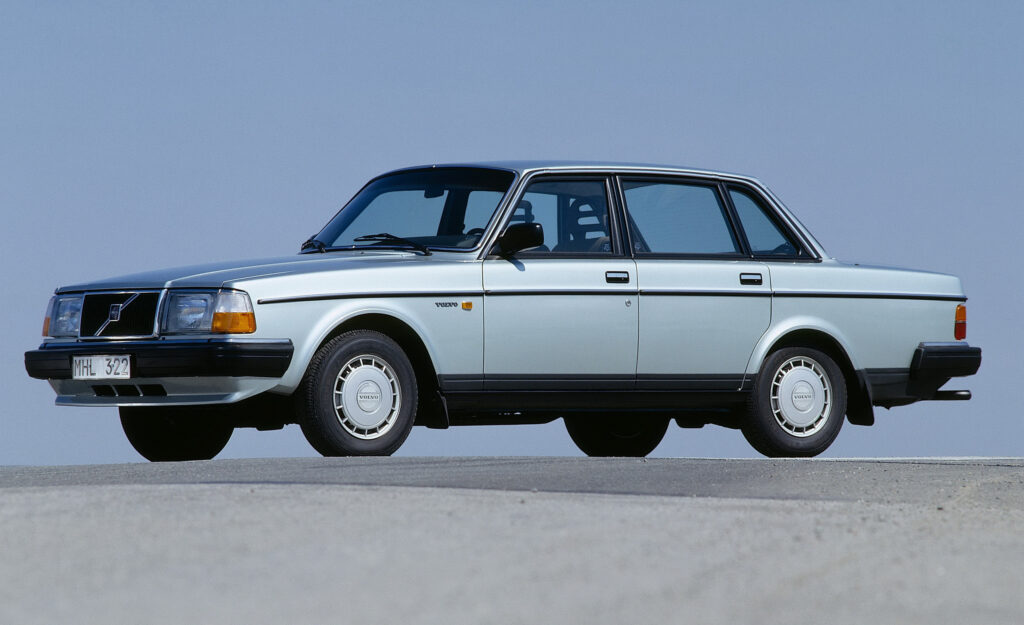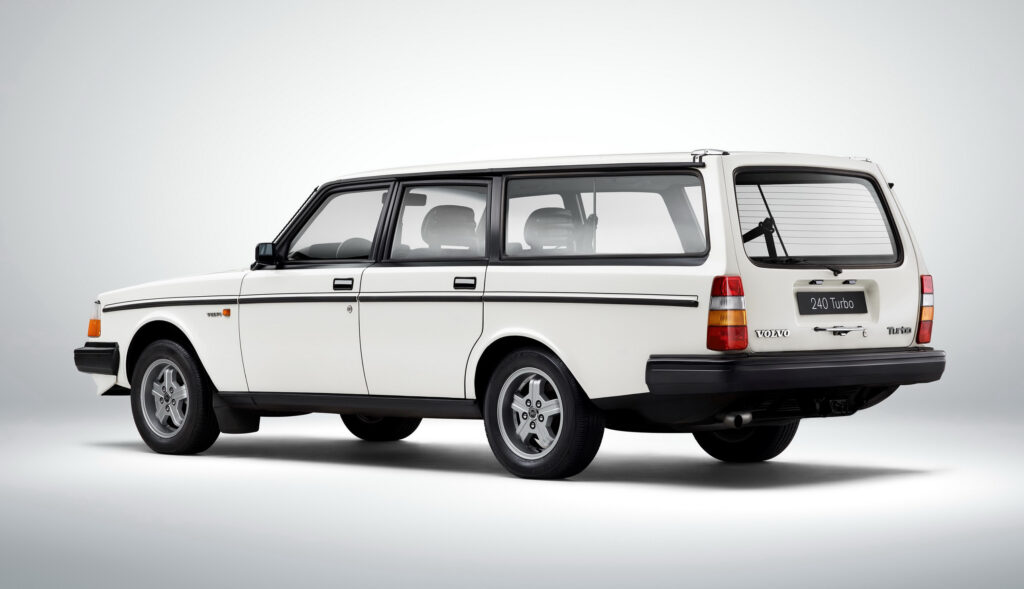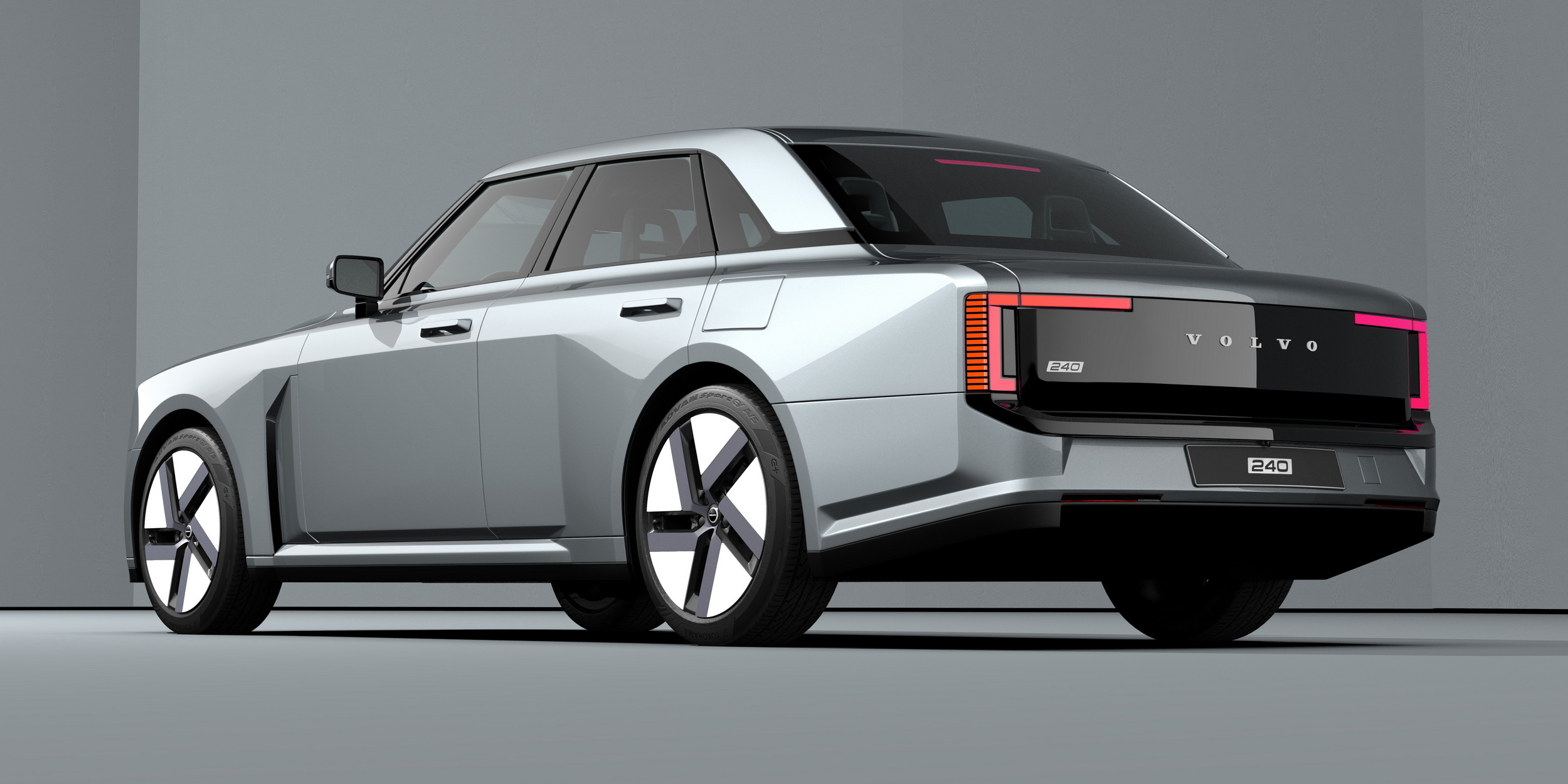- The Volvo 240 from the ’80s inspired an independent design study for a fully electric vehicle.
- Jordan Rubinstein-Towler modernized the boxy shape of the classic in sedan and wagon variants.
- In an alternate universe, these EVs could serve as successors to the discontinued S60/V60.
Volvo, a brand synonymous with safety and Scandinavian design, has long balanced practicality with understated style—a tradition likely to continue with the upcoming battery-electric ES90 flagship sedan set to debut in March 2025. But what happens when that future is reimagined through a daring retro lens?
Independent designer Jordan Rubinstein-Towler has taken it upon himself to offer a thought-provoking answer to that hypothetical question with his fictional 2026 Volvo 240 concept. This reimagined version serves as a modern homage to the brand’s iconic, boxy past, while seamlessly integrating cutting-edge technology and premium design elements to bring the classic silhouette into the 21st century.
More: BMW’s E30 M3 Reimagined As A Modern Neue Klasse Tribute
As much as Volvo has turned not just a page but an entire chapter in its design evolution in recent years, ask any buyer—or better yet, an auto enthusiast—what the most iconic Volvo design is, and chances are they’ll say the 200 Series.
The original Volvo 200 Series, produced from 1974 to 1993 as the successor to the equally angular 100 Series—both the work of designer Jan Wilsgaard—has since achieved cult status. It’s often hailed as the indestructible automotive equivalent of the Nokia 3310: sturdy, unkillable, and unapologetically utilitarian. But in Rubinstein-Towler’s vision, this stalwart is reimagined for a very different era, one where charm must coexist with cutting-edge connectivity and aerodynamic finesse.
Classic Meets Contemporary Design
Illustrations Jordan Rubinstein-Towler
Building on the retro-racing ethos of his earlier Polestar 4040 concept, which itself paid homage to the motorsport legacy of the Volvo 240, Rubinstein-Towler’s 2026 interpretation rethinks the roadgoing sedan and wagon. While the proportions and upright stance are unmistakably faithful to the original, the concept injects contemporary flair. Boxy headlights and the trademark black-pillared greenhouse nod to the past, while the execution feels anything but dated.
Modern design elements, like Volvo’s signature “Thor’s Hammer” LED headlight graphics, streamlined alloy wheels, and taut, clean surfacing, bring the fictional 240 firmly into the 21st century. Meanwhile, subtle aerodynamic flourishes, such as slim bumper intakes and neatly integrated side gills, elevate its efficiency beyond the brick-like aerodynamics of its predecessor.
Tech-Forward Interior with Retro Flair
Illustrations Jordan Rubinstein-Towler
The independent designer, who many of you may remember for his awesome Acura Integra Type R concept, took the time to create a minimalist interior for the fictional Volvo, adding high-tech features and sustainable materials. Here, he strikes a sweet balance between nostalgia and innovation, imagining a cabin that manages to be retro without veering into kitsch.
Unlike the portrait infotainment display of modern Volvo offerings, the 240 adopts a more conventional and much slimmer, horizontally-arranged, digital cockpit, accented by tactile physical controls—a restrained but welcome rejection of the touchscreen glut. The four-spoke steering wheel, a deliberate callback to the 200 Series, and fabric-upholstered seats with a distinctly Scandinavian vibe tie the cabin to Volvo’s legacy.


What It Could Be Based On
The 2026 Volvo 240 was designed as an EV, something that is evident from the fully sealed grille and the absence of exhaust pipes. The mid-size sedan could, in theory, ride on the Geely-sourced SPA2 platform shared with Volvo’s EX90 SUV, leveraging a hefty 111-kWh battery pack and dual electric motors producing up to 510 horsepower (380 kW / 517 PS). The potential for such a powertrain adds a sense of plausibility to the otherwise speculative project.
Electric Dreams?
And yet, as is the fate of most independently-designed concepts, this reimagined Volvo 240 will likely remain a digital fantasy. Still, it’s hard not to imagine how a production version might disrupt the market. In an alternate universe, this retro-inspired EV could seamlessly replace the S60 and V60, injecting some much-needed character into the midsize segment—perhaps even giving BMW’s forthcoming Neue Klasse a proper rival.
What do you think; should Volvo take a second look? Head over to the comments and have your say.





















